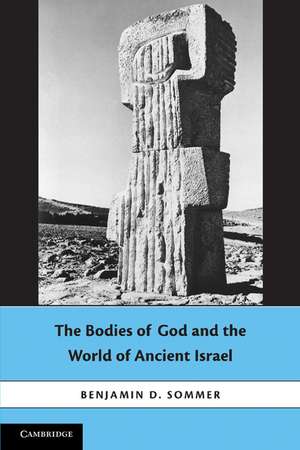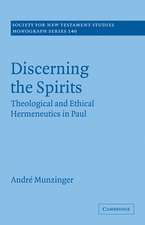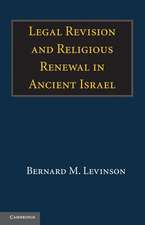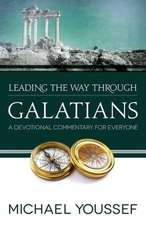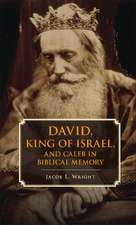The Bodies of God and the World of Ancient Israel
Autor Benjamin D. Sommeren Limba Engleză Paperback – 16 ian 2011
| Toate formatele și edițiile | Preț | Express |
|---|---|---|
| Paperback (1) | 430.86 lei 6-8 săpt. | +102.45 lei 4-10 zile |
| Cambridge University Press – 16 ian 2011 | 430.86 lei 6-8 săpt. | +102.45 lei 4-10 zile |
| Hardback (1) | 563.46 lei 6-8 săpt. | |
| Cambridge University Press – 28 iun 2009 | 563.46 lei 6-8 săpt. |
Preț: 430.86 lei
Nou
Puncte Express: 646
Preț estimativ în valută:
82.47€ • 89.61$ • 69.32£
82.47€ • 89.61$ • 69.32£
Carte tipărită la comandă
Livrare economică 21 aprilie-05 mai
Livrare express 14-20 martie pentru 112.44 lei
Preluare comenzi: 021 569.72.76
Specificații
ISBN-13: 9781107422261
ISBN-10: 1107422264
Pagini: 352
Dimensiuni: 152 x 229 x 19 mm
Greutate: 0.57 kg
Editura: Cambridge University Press
Colecția Cambridge University Press
Locul publicării:New York, United States
ISBN-10: 1107422264
Pagini: 352
Dimensiuni: 152 x 229 x 19 mm
Greutate: 0.57 kg
Editura: Cambridge University Press
Colecția Cambridge University Press
Locul publicării:New York, United States
Cuprins
1. Introduction: God's body and the Bible's interpreters; 2. Fluidity of divine embodiment and selfhood: Mesopotamia and Canaan; 3. The fluidity model in ancient Israel; 4. The rejection of the fluidity model in ancient Israel; 5. God's bodies and sacred space (1): tent, ark, and temple; 6. God's bodies and sacred space (2): difficult beginnings; 7. The perception of divinity in Biblical tradition: implications and afterlife.
Recenzii
Reviews of the hardback: 'An innovative and illuminating exploration of the idea that God in the Hebrew Bible is embodied. Benjamin Sommer explores the various modes of embodiment found in different sources and shows that both rabbinic and mystical Judaism, as well as Christianity, have roots in the variety of presentations in the Hebrew Bible. A characteristically lucid and original book.' John Barton, Oriel College, University of Oxford
'Sommer's audacious and original analyses of fascinating aspects of biblical theology, the fluidity and the embodiment of God against their Near Eastern backgrounds, open new questions and facilitate new solutions as to the later developments of Jewish thought, especially the sources of Kabbalistic theosophy.' Moshe Idel, Department of Jewish Thought, Hebrew University
'This very original work raises profound questions about how to understand the way in which the Biblical God (and the gods of the ancient Near East) makes his person manifest in the world. Readers will be stimulated to think about the identity of God in strikingly new ways.' Gary Anderson, University of Notre Dame
'… an important study of a fascinating topic: how the Hebrew Bible understands the body of God. … Sommer explores … in fresh ways, pointing out … profound interconnections and persuasively challenging in the process long-held scholarly views. He is particularly attentive to the variety of perspectives on God's body that the biblical authors present. … Throughout … [he] remains the consummate analyst, discerning and discriminating in his reading of the ancient sources and the modern scholarship on them. And yet his book is not only that of a discriminating analyst. In its lively, incisive, and conversational style, it is also a deeply personal encounter with fundamental and troubling issues about the relationship of divinity and humanity - issues that, as he makes clear, have not lost their relevance and their bite.' Peter Machinist, Hancock Professor of Hebrew and Other Oriental Languages, Harvard University
'Sommer uncovers a lost ancient Near Eastern perception of divinity according to which an essential difference between gods and humans was that gods had more than one body and fluid, unbounded selves.' International Review of Biblical Studies
'Sommer's audacious and original analyses of fascinating aspects of biblical theology, the fluidity and the embodiment of God against their Near Eastern backgrounds, open new questions and facilitate new solutions as to the later developments of Jewish thought, especially the sources of Kabbalistic theosophy.' Moshe Idel, Department of Jewish Thought, Hebrew University
'This very original work raises profound questions about how to understand the way in which the Biblical God (and the gods of the ancient Near East) makes his person manifest in the world. Readers will be stimulated to think about the identity of God in strikingly new ways.' Gary Anderson, University of Notre Dame
'… an important study of a fascinating topic: how the Hebrew Bible understands the body of God. … Sommer explores … in fresh ways, pointing out … profound interconnections and persuasively challenging in the process long-held scholarly views. He is particularly attentive to the variety of perspectives on God's body that the biblical authors present. … Throughout … [he] remains the consummate analyst, discerning and discriminating in his reading of the ancient sources and the modern scholarship on them. And yet his book is not only that of a discriminating analyst. In its lively, incisive, and conversational style, it is also a deeply personal encounter with fundamental and troubling issues about the relationship of divinity and humanity - issues that, as he makes clear, have not lost their relevance and their bite.' Peter Machinist, Hancock Professor of Hebrew and Other Oriental Languages, Harvard University
'Sommer uncovers a lost ancient Near Eastern perception of divinity according to which an essential difference between gods and humans was that gods had more than one body and fluid, unbounded selves.' International Review of Biblical Studies
Notă biografică
Descriere
Sommer utilizes a recovered ancient perception of divinity as having more than one body, fluid and unbounded selves.
